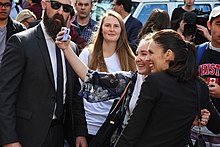Jacindamania
Jacindamania is a term coined to refer to enthusiastic public showings of support for Jacinda Ardern, the 40th and current Prime Minister of New Zealand, following her elevation to the Labour Party leadership on 1 August 2017. The ensuing surge in support and attention was referred to in the media as "Jacindamania" or the "Jacinda effect".

History
Immediately following her appointment as leader, the Labour Party was inundated with donations from the public, reaching up to NZ$700 per minute at its peak.[1] Ardern's election was followed by a spate of positive coverage from many sections of the media, including international outlets such as CNN,[2] with commentators referring to a "Jacinda effect" or "Jacindamania".[3][4] Many subsequent public events featuring Ardern have been characterised by large crowds and capacity attendance; such as at the 2018 Labour Party Conference, where the Dunedin Town Hall was filled to its maximum 1,200 person capacity. Hundreds more people, unable to enter, queued on the street outside in a line that snaked around the building.[5]
A year after Ardern forming her government, The Guardian's Eleanor Ainge Roy reported that Jacindamania was waning in the population, with not enough of the promised change visible.[6] When Toby Manhire, the editor of The Spinoff, reviewed the decade in December 2019, he praised Ardern for her leadership following the Christchurch mosque shootings and the Whakaari / White Island eruption:[7]
Ardern ... revealed an empathy, steel and clarity that in the most appalling circumstances brought New Zealanders together and inspired people the world over. It was a strength of character that showed itself again this week following the tragic eruption at Whakaari.
— Toby Manhire, The Spinoff, 11 December 2019
Reaction
The "Jacindamania" phenomenon was cited as a major factor behind New Zealand gaining global attention and media influence in many reports, including the Soft Power 30 index.[8]
See also
References
- "Donations to Labour surge as Jacinda Ardern named new leader". The New Zealand Herald. 2 August 2017. Retrieved 7 September 2017.
- Griffiths, James (1 September 2017). "'All bets are off' in New Zealand vote as 'Jacindamania' boosts Labour". CNN. Archived from the original on 1 September 2017. Retrieved 1 September 2017.
- Peacock, Colin (3 August 2017). "'Jacinda effect' in full effect in the media". Radio New Zealand. Archived from the original on 16 August 2017. Retrieved 16 August 2017.
- Ainge Roy, Eleanor (10 August 2017). "New Zealand gripped by 'Jacindamania' as new Labour leader soars in polls". The Guardian. ISSN 0261-3077. Archived from the original on 14 September 2017. Retrieved 13 September 2017.
- Sachdeva, Sam (5 November 2018). "Ardern feels the love as Labour revels in power". Newsroom. Retrieved 18 September 2019.
- Ainge Roy, Eleanor (21 October 2018). "Ardern's first year: New Zealand grapples with hangover from Jacindamania". The Guardian. ISSN 0261-3077. Retrieved 5 May 2020.
- Manhire, Toby (11 December 2019). "The decade in politics: From Team Key to Jacindamania". The Spinoff. Retrieved 5 May 2020.
- Bateman, Sophie (16 July 2018). "Jacindamania helped NZ's global influence, index reveals". Newshub. Retrieved 17 July 2018.
